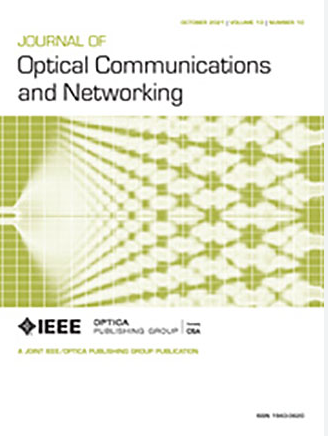通过可调鲁棒性优化和深度强化学习实现 IP 光网络中的多层修复
IF 4
2区 计算机科学
Q1 COMPUTER SCIENCE, HARDWARE & ARCHITECTURE
引用次数: 0
摘要
如今,IP-光网络将 IP 恢复作为从光故障中恢复 IP 流量的默认策略。与光恢复相比,这种策略更受青睐,因为它避免了光层重新配置所带来的长时间延迟。IP 恢复虽然速度快,但需要超额配置昂贵的容量来应对光故障。软件定义光网络的出现,使我们能够转向集成 IP 光恢复功能的更高效方法。这些方法不仅能从规划阶段考虑的故障中恢复流量,还能从不可预见的故障中有效恢复流量。本文以可调整鲁棒优化(ARO)理论为基础,通过研究容量规划和多层恢复的优化算法来研究这一问题。该方法在无故障运行模式和预知光故障情况下,对 IP 链路的容量以及 IP 隧道的路由和容量进行离线优化。此外,该方法还优化了仿射策略,该策略可在线应用,以从不可预见的故障中恢复 IP 流量,从而为规划阶段未考虑到的光故障提供稳健性。为了克服仿射策略的局限性,基于深度强化学习(DRL)和图神经网络(GNN)制定了另一种稳健算法。通过训练 DRL-GNN 代理,可在发生不可预见的光故障时进一步将流量损失降至最低,从而提高恢复过程的性能。选定场景中的结果表明,这些算法在容量要求方面优于 IP 恢复,同时在故障情况下最大限度地减少了流量损失。此外,DRL-GNN 方法显著改进了基于 ARO 的仿射算法,显示了学习光故障造成的容量损害与恢复 IP 流量所需的路由策略之间复杂关系的能力。本文章由计算机程序翻译,如有差异,请以英文原文为准。
Multilayer restoration in IP-Optical networks by adjustable robust optimization and deep reinforcement learning
Today, IP-Optical networks apply IP restoration as the default strategy to recover IP traffic from optical failures. This strategy has been preferred over optical restoration as it circumvents the lengthy delays involved in the reconfiguration of the optical layer. Although fast, IP restoration requires the overprovisioning of costly capacity to cope with optical failures. The advent of software-defined optical networking enables a changeover towards more efficient methods that integrate IP-Optical restoration. These methods should not only restore traffic from failures considered in the planning phase, but they should also efficiently restore traffic from unforeseen failures. This paper studies this problem by investigating optimization algorithms for capacity planning and multilayer restoration based on the theory of adjustable robust optimization (ARO). The approach performs offline optimization of the capacities of IP links as well as the routing and capacities of IP tunnels in both failure-free mode of operation and in a foreseen set of optical failures. Besides, the approach optimizes an affine policy that is applied online to recover IP traffic from unforeseen failures, thereby providing robustness to optical failures not regarded in the planning phase. To overcome the limitations of the affine policy, an alternative robust algorithm is formulated based on deep reinforcement learning (DRL) and graph neural networks (GNNs). By training a DRL-GNN agent, the performance of the restoration process is improved by further minimizing the traffic losses when unforeseen optical failures occur. Results in selected scenarios show that the algorithms outperform IP restoration in terms of capacity requirements, while minimizing the traffic losses in the case of failures. Moreover, the DRL-GNN method significantly improves the ARO-based affine algorithm, which shows the capability of learning the complex relationship between the capacity impairments caused by optical failures and the routing strategy required to restore IP traffic.
求助全文
通过发布文献求助,成功后即可免费获取论文全文。
去求助
来源期刊
CiteScore
9.40
自引率
16.00%
发文量
104
审稿时长
4 months
期刊介绍:
The scope of the Journal includes advances in the state-of-the-art of optical networking science, technology, and engineering. Both theoretical contributions (including new techniques, concepts, analyses, and economic studies) and practical contributions (including optical networking experiments, prototypes, and new applications) are encouraged. Subareas of interest include the architecture and design of optical networks, optical network survivability and security, software-defined optical networking, elastic optical networks, data and control plane advances, network management related innovation, and optical access networks. Enabling technologies and their applications are suitable topics only if the results are shown to directly impact optical networking beyond simple point-to-point networks.

 求助内容:
求助内容: 应助结果提醒方式:
应助结果提醒方式:


